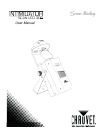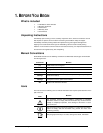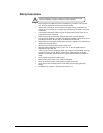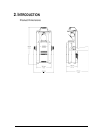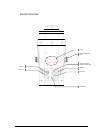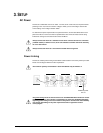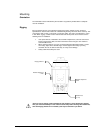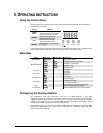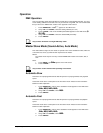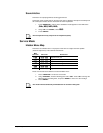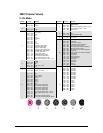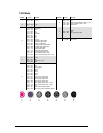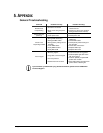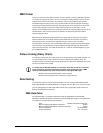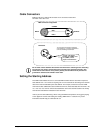
4. Operating Instructions 9 10/25/2010 10:23 AM
4. OPERATING INSTRUCTIONS
Using the Control Panel
Access control panel functions using the four buttons located directly underneath the LED display on
the included wired remote.
B
UTTON FUNCTION
<MODE
ESC>
Used to scroll through the current
operating mode, as well as back
out of the current menu option
<DOWN>
Used to select decreasing
advancement in the value
<UP>
Used to select increasing
advancement in the value
<ENTER>
Used to select a value and store
it to memory
Use the control panel to select the operating mode, as well as the sub-features. For a detailed layout of
the control panel functions, please see the “menu map” section on the previous page.
Menu Map
M
ENU SELECTION 1 SELECTION 2 DESCRIPTION
DMX Address
d001~512
DMX starting address
Standalone Mode
SLAv Son
Standalone: Slave receive mode
Nsts SrUn
Standalone: sound-active
NAFA
F
ASt
Standalone: fast
NASL SLoU
Standalone: slow
Pan Invert
PAN
No function
r
PAN
Pan invert
Tilt Invert
t
it
No function
Rtit
Tilt invert
Display Invert
Dis
No function
RdiS
Invert the display
Personality
8CH
8-channel personality
11CH
11-channel personality
Reset
rESt
Reset all motors to correct any errors with
motors misaligning during operation
Load Default
L
oAd
Revert all settings back to the factory default
Configuring the Starting Address
The Intimidator™ Scan LED 300
fixture uses up to 11 DMX channels. In this DMX
configuration/personality, the highest channel that the fixture may be set to in order to function properly
is 502. Any address higher than this will prevent access to all of the channels, while in this mode;
however, if you desire to use one of the other DMX channels configurations (personalities), please
consider the total DMX channels when selecting a DMX address.
The Intimidator™ Scan LED 300 fixture uses 8 or 11 DMX channels, depending on the selected DMX
configuration (personality). If this is your first time using DMX, we recommend reading the “DMX
Primer” section in the “Appendix”.



